|
|
|
Sort Order |
|
|
|
Items / Page
|
|
|
|
|
|
|
| Srl | Item |
| 1 |
ID:
169131
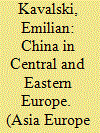

|
|
|
|
|
| Summary/Abstract |
The Central and East European (CEE) part of the Eurasian landmass is often overlooked in the conversations on contemporary geopolitics. Yet, owing to China’s relations with the CEE countries, the region has been subject to growing strategic attention. This article offers a brief overview of the history of this relationship by focusing on the “17+1” mechanism. Nestled within the broader Belt and Road Initiative (BRI), the “17+1” has provided a unique regional arrangement for extending Chinese influence in the sixteen CEE countries. The article inquires whether there is something else than the instrumental economic reasoning for the willingness of CEE countries to partner with China. The analysis detects three distinct strategic narratives motivating the participation of CEE states in the “17+1” mechanism. The study concludes with an enquiry on China’s preparedness to respond to such identity geopolitics not only in the CEE region, but throughout the vast expanse covered by the BRI initiative.
|
|
|
|
|
|
|
|
|
|
|
|
|
|
|
|
| 2 |
ID:
089534


|
|
|
|
|
| Publication |
Hampshire, Ashgate, 2009.
|
| Description |
xi, 206p.
|
| Standard Number |
9780754649847
|
|
|
|
|
|
|
|
|
|
|
|
Copies: C:1/I:0,R:0,Q:0
Circulation
| Accession# | Call# | Current Location | Status | Policy | Location |
| 054298 | 320.4049/KAV 054298 | Main | On Shelf | General | |
|
|
|
|
| 3 |
ID:
057978


|
|
|
|
|
| Publication |
Jul-Sep 2004.
|
|
|
|
|
|
|
|
|
|
|
|
|
|
|
|
| 4 |
ID:
145780
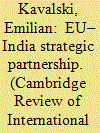

|
|
|
|
|
| Summary/Abstract |
While formally labelled as ‘strategic’, the European Union (EU)–India partnership is more often than not described as ‘lukewarm’ and ‘reluctant’. Thus, by process-tracing the EU–India relationship, this article reveals the significance of 1999 as a crucial point that has urged both Brussels and New Delhi to significantly alter both their outlook on global life and on each other. The bilateral relationship will be shown to be a story of two actors aspiring to global prominence, who—to their mutual frustration—find themselves consigned and constrained to play a leading role only in their respective neighbourhoods. The bilateral relationship seems only to reinforce this marginalization in global affairs, as neither of the strategic partners considers the other significant enough to develop meaningful relations with them.
|
|
|
|
|
|
|
|
|
|
|
|
|
|
|
|
| 5 |
ID:
157600
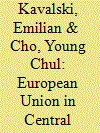

|
|
|
|
|
| Summary/Abstract |
The foreign policy statements of the European Union (EU) have long been positioning it as a global normative power. Yet, its ability to “Europeanize” international affairs has rarely been examined outside of the EU enlargement framework. In this respect, the EU’s initiatives in Asia offer a relevant context for the consideration of its global outreach. In order to examine whether the EU has been able to catalyze the global relevance of its normative power, this study undertakes a parallel assessment of its engagement with the countries of Central Asia and Afghanistan. The suggestion is that the cultural instincts of the EU’s normative power entrap its agency in Central Asia and Afghanistan and make it difficult for Brussels to develop a coherent strategy not only in the region, but also in Asia.
|
|
|
|
|
|
|
|
|
|
|
|
|
|
|
|
| 6 |
ID:
073145
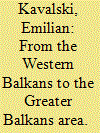

|
|
|
| 7 |
ID:
161573


|
|
|
|
|
| Summary/Abstract |
The phenomenon of China’s rise has urged some to look for International Relations (IR) theories with ‘Chinese characteristics’. A number of these have been associated with the ‘relational turn’. Yet, attempts to bring the Anglophone and the Sinophone strands of the relational turn have failed to transcend the bifurcating metanarrative of the mainstream. To rectify this trend, the analysis engages the literatures on guanxi, the relational turn, and Chinese IR and develops a normative claim about the underlying relationality of knowledge production in post-Western IR. The contention is: (i) that the criticism of substantialism offered by the Anglophone literature on the relational turn fails to overcome its Eurocentrism; (ii) that by subscribing to the epistemic duality of the West vs. the non-West, the Sinophone literature has aborted the political promise of the concept of guanxi. The study deploys guanxi to amplify the intrinsic relationality both of global life and the realms of IR.
|
|
|
|
|
|
|
|
|
|
|
|
|
|
|
|
| 8 |
ID:
119773
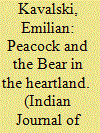

|
|
|
| 9 |
ID:
095188


|
|
|
|
|
| Publication |
2010.
|
| Summary/Abstract |
This essay examines the domestic logic informing the creation of Bulgaria's foreign policy. It contextualizes inferences made from Bulgaria's diplomatic attempt to "play the EU" during the visit by the Bulgarian minister of foreign affairs to Central Asia in September 2007. Inferences of the national narratives of Bulgaria's international involvement are contextualized to suggest that domestically the Europeanization of Bulgarian foreign policy has been preoccupied with negotiating the conflict between state and nation. A report on Central Asia indicates that the logic of mythmaking informs the domestic articulation of the foreign policy stance coming from Sofia, Bulgaria's capital, not only toward neighboring countries (where it might be expected, as has been well documented) but also toward regions that are not geographically proximate. Inferences are contextualized by the national narratives of Bulgaria's international involvement. Such positions suggest that domestically the Europeanization of Bulgarian foreign policy has been preoccupied with negotiating conflict between state and nation.
|
|
|
|
|
|
|
|
|
|
|
|
|
|
|
|
| 10 |
ID:
169250
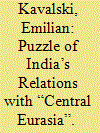

|
|
|
|
|
| Summary/Abstract |
India’s relations with Afghanistan and the post-Soviet countries of Central Asia have contributed to the growing interest in the country’s rise. By treating them together as “Central Eurasia,” the discourses of Indian foreign policy invoke a contiguous geopolitical locale bound to India by a shared past. Yet, despite the strategic articulation of a manifest Central Eurasian region, the article uncovers a puzzle of bifurcation in India’s foreign policy reflecting distinct operationalizations of India’s cultural capital in its relations with Afghanistan and the Central Asia republics. The comparative analysis indicates that prior historical experience becomes a compelling strategic context for the continuous framing and reframing of the country’s foreign policy space, which reveals India’s shifting perceptions of international order, self-identity, and global roles. India’s interactions in Central Eurasia offer a good illustration of the crossroads that New Delhi’s foreign policy is facing – either keep on proliferating discourses that spin yarns of the international influence of its historical capital or develop proactive diplomatic strategies that deliver the international status that India desires.
|
|
|
|
|
|
|
|
|
|
|
|
|
|
|
|
| 11 |
ID:
182514


|
|
|
|
|
| Summary/Abstract |
The countries of Central and Eastern Europe (CEE) used to be quite buoyant about benefiting from China’s economic largesse. A little over a year ago, China’s cooperation with the region was brandished as a real feather in China’s foreign policy cap. Today, however, the China-CEE cooperation appears to be done with. This development has led many to question whether the China-CEE cooperation has become a victim of the COVID-19 pandemic. The answer provided here is: no, not at all! Most CEE states have been mulling a freeze in their participation for quite some time. In this respect, the pandemic has only accelerated the social distancing of CEE countries from China. The study suggests that the unrequited romance of China with the CEE region has important implications both for the country’s public diplomacy and the post-pandemic trajectories of the Belt and Road Initiative.
|
|
|
|
|
|
|
|
|
|
|
|
|
|
|
|
| 12 |
ID:
096040


|
|
|
|
|
| Publication |
2010.
|
| Summary/Abstract |
This article offers a much-needed conceptual analysis of China's emerging international agency in Central Asia. In particular it engages with the apparent susceptibility of Central Asian states to China's normative power. The contention is that the emphasis on the dynamics of international socialization offers a relevant framework for evaluating Beijing's capacity to engage regional states. By relying on its normative power, China has gradually attracted Central Asia into its sphere of influence through the promotion of various initiatives for regional cooperation consolidated in the Shanghai Cooperation Organization. Such conceptualization of Beijing's conditioning propensity reflects upon China's international role(s) in the region.
|
|
|
|
|
|
|
|
|
|
|
|
|
|
|
|
| 13 |
ID:
097558


|
|
|
|
|
| Publication |
Surrey, Ashgate Publishing, 2010.
|
| Description |
xii, 236p.
|
| Standard Number |
9780754676003, hbk
|
|
|
|
|
|
|
|
|
|
|
|
Copies: C:1/I:0,R:0,Q:0
Circulation
| Accession# | Call# | Current Location | Status | Policy | Location |
| 055070 | 320.958/KAV 055070 | Main | On Shelf | General | |
|
|
|
|
| 14 |
ID:
106981


|
|
|
|
|
| Publication |
Surrey, Ashgate Publishing, 2010.
|
| Description |
xii, 236p.
|
| Standard Number |
9780754676003, hbk
|
|
|
|
|
|
|
|
|
|
|
|
Copies: C:1/I:0,R:0,Q:0
Circulation
| Accession# | Call# | Current Location | Status | Policy | Location |
| 056177 | 320.958/KAV 056177 | Main | On Shelf | General | |
|
|
|
|
| 15 |
ID:
120739


|
|
|
|
|
| Publication |
2013.
|
| Summary/Abstract |
Who or what is a normative power? In response to this query the article suggests that normative powers are those actors that are recognized as such by others. This qualifies Ian Manners's oft-quoted proposition that normative powers are only those actors that have the ability to 'shape what can be "normal" in international life'. The proposition is that the definitions of the 'normal' are not merely undertaken by normative power, but they emerge in the context of its interaction with others. Recognition, in this setting, is indicated by the specific reactions of target states. In this respect, the issue is not merely about being and becoming a normative power, but also about being recognized as one by others. The article details this proposition through a parallel assessment of normative power Europe and normative power China. The intention of such comparison is to elicit the key elements of normative power in global life.
|
|
|
|
|
|
|
|
|
|
|
|
|
|
|
|
| 16 |
ID:
170649


|
|
|
|
|
| Summary/Abstract |
The Central and East European (CEE) region is often overlooked in the conversations on contemporary geopolitics. Yet, owing to China’s growing relations in
the CEE countries, the region has been subject to increasing international attention. By process tracing the development of the ‘17 + 1’ mechanism, this article
offers a brief overview of Sino-CEE relations. Situated within the broader Belt
and Road Initiative (BRI), the ‘17 + 1’ has provided a unique regional arrangement for extending Chinese influence in the CEE countries. This article explores
whether there is something else than the instrumental economic reasoning for
the willingness of CEE countries to partner with China. The analysis detects
three distinct (and not always complementary) strategic narratives, motivating
the participation of CEE states in the ‘17 + 1’ mechanism. The study concludes
with an enquiry on China’s preparedness to respond to such identity geopolitics
not only in the CEE region but also throughout the vast expanse covered by the
BRI initiative.
|
|
|
|
|
|
|
|
|
|
|
|
|
|
|
|
| 17 |
ID:
084879


|
|
|
|
|
| Publication |
2008.
|
| Summary/Abstract |
This article brings together the diverse suggestions on the nascent strategic partnership between the European Union (EU) and India. Apart from focusing on popular and policy perceptions, this inquiry undertakes a discursive assessment of key documents defi ning the institutional and ideational frameworks of relations between Brussels and New Delhi. Such narrative analysisallows for innovative tracing of the genealogy, distinct grammars and contradictions of their interactions. Thus, while many of the commentaries on the emerging agency of the EU and India are primarily aimed at making an empirical contribution, this investigation offers a theoretically-informed refl ection on their debates. The contention is that an analytical observation can elicit underlying patterns that tend to remain occluded by the focus on trade fi gures, commercial output or military capabilities.
|
|
|
|
|
|
|
|
|
|
|
|
|
|
|
|
| 18 |
ID:
077219


|
|
|
|
|
| Publication |
2007.
|
| Summary/Abstract |
This analysis undertakes a preliminary conceptual assessment of the international agency of the European Union (EU) and China in Central Asia. The contention is that the strategies advanced by both Brussels and Beijing in the region reflect not only their desire to introduce a framework of predictability allowing them to make feasible calculations about future intentions, but also the increasing 'fragmegration' of international life. The contention is that the external agency of the EU and China attests to the normative power of their foreign policies. However, the values and norms of the international agency of Brussels and Beijing reflect their distinct experiences and suggest their clashing interests. The article concludes with a brief appraisal of the prospective trends in EU-China interactions in Central Asia.
|
|
|
|
|
|
|
|
|
|
|
|
|
|
|
|
|
|
|
|
|